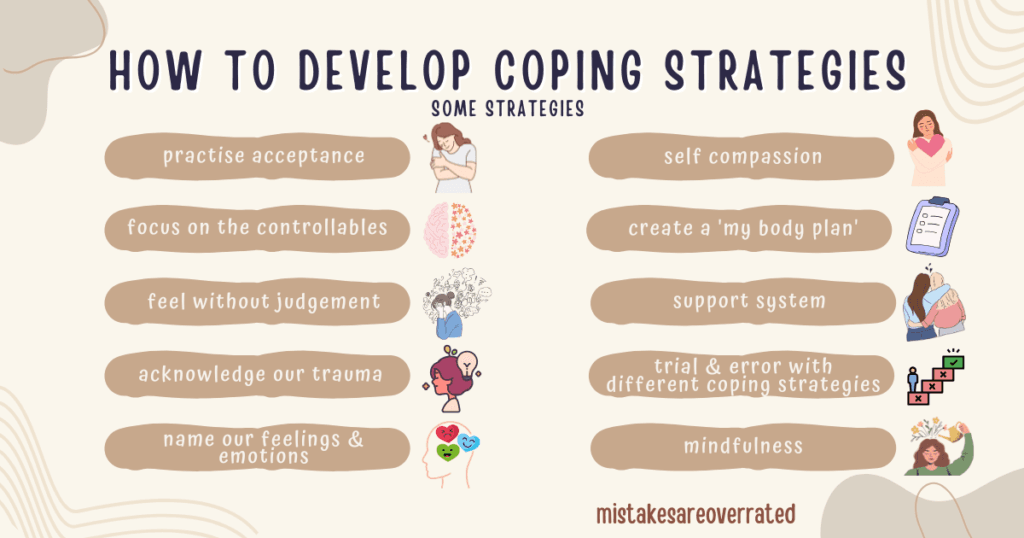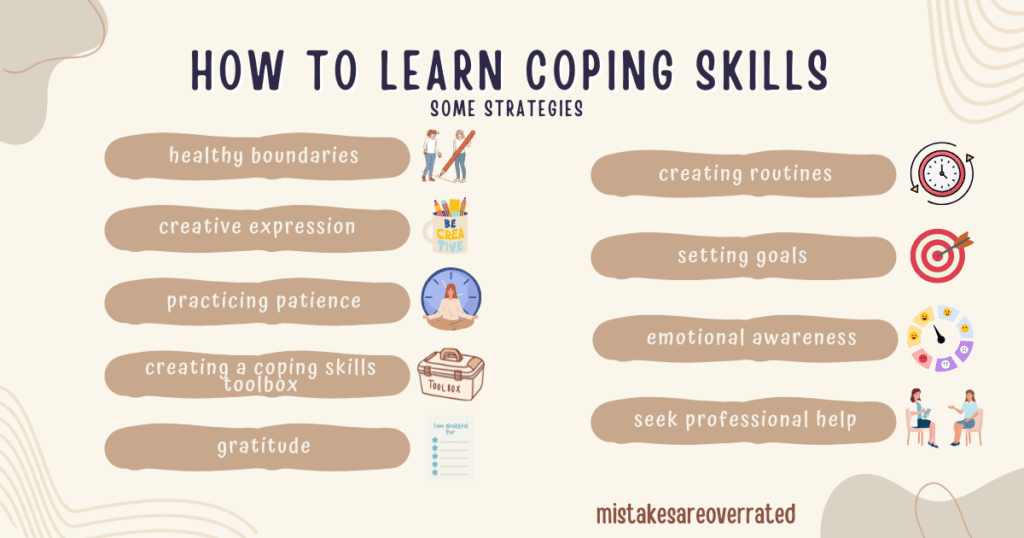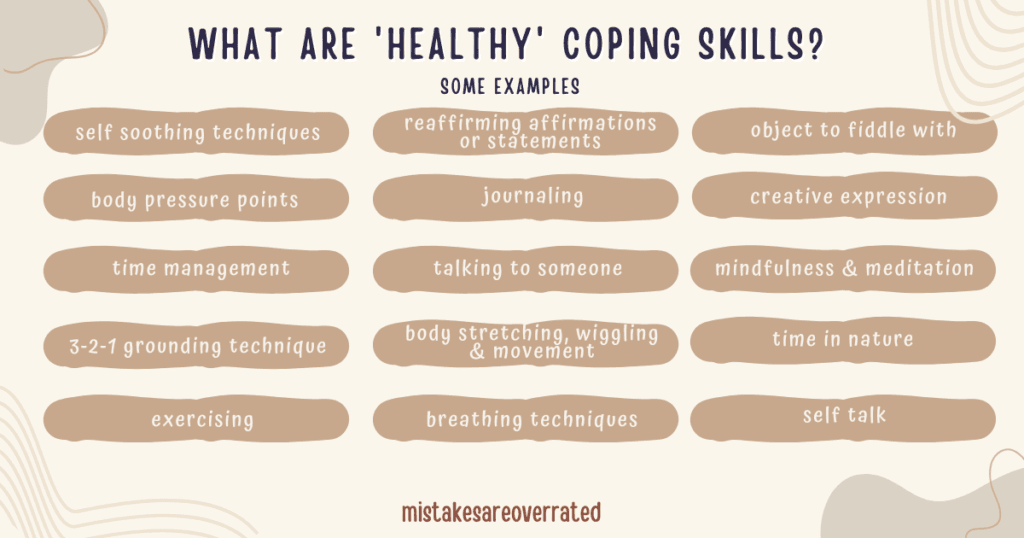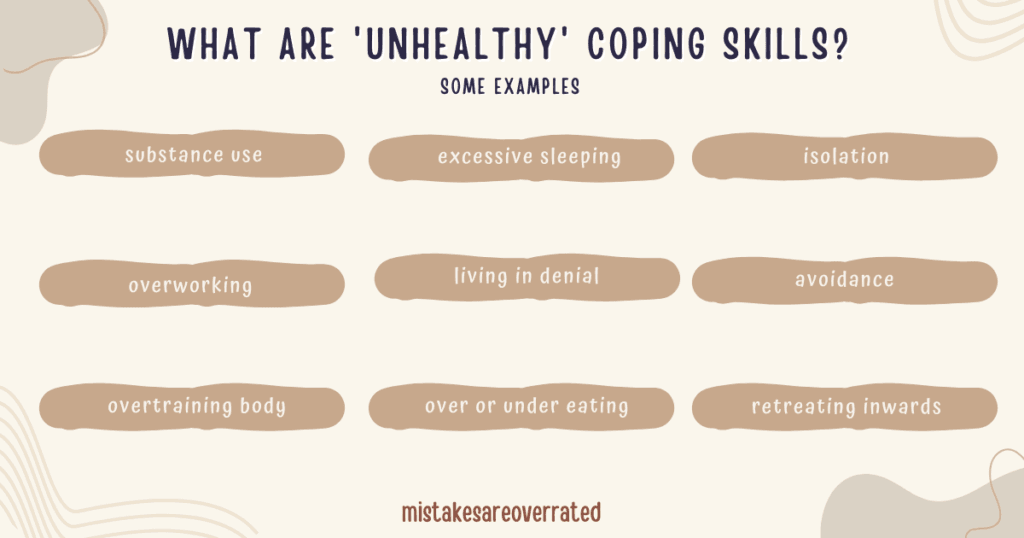*content warning* please be advised this article contains discussion of trauma, triggers, grief and recommendation of deep internal work that may bring up some buried emotions and memories. please read at your own discretion.
developing effective coping skills can make a significant difference in our healing journey and how we are able to navigate through our pain.
finding self soothing skills that work for us, empowers us to face the difficult memories, emotions, and triggers that arise in our journeys.
as humans, we tend to wish for our positive, joyful emotions to stay forever, however, we know they don’t stay.
on the flipside, when we feel more daunting or negative emotions, we convince ourself, or feel as though, they are going to last forever.
however, they don’t.
we need to understand that no matter how strong we feel these harder emotions, they will eventually pass.
sometimes we get stuck in these negative emotions due to our lack of acceptance, processing and releasing of them.
lets explore some practical strategies to help us develop healthy coping mechanisms that support our healing process.
how to develop coping skills
finding healthy coping strategies that work for our body is a good thing, as we are finding effective ways to cope with challenging times.
but how do i develop these self soothing strategies?
this is the system i wish someone had told me at the beginning of my healing journey.
through my experience, these are the steps that helped me when i was developing my coping strategies.
acknowledge – by acknowledging our trauma, it helps us recognise the impact in has on us, which is the first step in finding ways to cope.
identify – identifying our trauma triggers and symptoms allows us to understand what affects us, and how we can effectively manage them.
release – releasing our emotions (e.g grief, pain or anger), can help prevent them building up.
it’s important to release our emotions, as this build up could possibly negatively impact our life, health and wellbeing.
brainstorm ways to self soothe / cope – creating ideas of strategies we can try out to have healthy tools to manage our emotional pain and stress.
test – this is where we test out different coping methods with trial and error, to help us find which ones work best for our body and mind.
reflect – it is important to reflect on our coping strategies so we can either adjust them for better results, or keep them if they are working for us.
track – tracking our progress can help us notice growth, identify patterns or habits, stay motivated and adjust any strategies for continued healing.
strategies to self soothe

practise acceptance
a very helpful tip when first learning to develop coping strategies, is accepting the fact that life isn’t easy.
we will be faced with challenges, obstacles and hard times.
once we accept this fact, it can become easier to think critically instead of emotionally, which helps us not be consumed by our hard times.
acceptance is one of the higher levels of consciousness that we as humans can experience.
i have found profound benefits from learning to accept and be at peace with difficult times.
when i say accept, i don’t mean we have to like or agree with the distressing situations or emotions we face.
i just means that we say “okay, there is an obstacle in my way. how am i going to get through this and what are ways i can help myself cope through this time?”
focus on the controllables
focus on what is in our control, and leave what is left to the external world and influences.
i suggest journaling, so we can see the circumstance on paper, rather then just replaying it in our mind.
when we write our experience down on paper, we have a visualisation of what we are going through.
-> this can be easier to help us identify any areas that our brain may be making the situation worse than it actually is,
-> identify areas that we can work on,
-> brainstorm ways to help us overcome this,
-> and it allows us to express and release what we are going through, instead of bottling it up, overthinking it or just straight up avoiding it.
allow yourself to feel without judgement
when these obstacles, challenges, difficult emotions or circumstances arise in our life, we need to allow ourselves to feel.
to feel whatever feelings and emotions they bring up in us, without any judgement!!!
this is another form of acceptance as,
we go through something -> this brings up feelings and emotions -> we accept these feelings and emotions -> we allow ourself to fully feel them
(without pushing them to the side, making excuses for them, numbing or escaping from them).
acknowledge our trauma
our healing journey truly begins when we recognise and accept the trauma we have experienced and endured.
acknowledging our experiences and the emotions that come with it, can help us understand our reactions, beliefs, triggers and thought patterns.
this can help immensely when learning to develop effective coping strategies within our healing journey.
name our feelings and emotions
get in the habit of labelling and naming what we are feeling. (a habit is formed with repetition, so patience will come in handy here).
once we acknowledge we are feeling a certain emotion, we should label what this emotion is that has risen within us.
this can help us sit with it (as we understand what we are feeling) and process it (as we are accepting the emotion felt).
i suggest journaling about the feelings and emotions that arise within when learning to name them.
engage in self compassion
the way we treat and talk to ourselves plays a key role in the way we are able to manage and cope with distress and emotional pain.
self compassion is when we treat ourself with empathy, kindness, patience, care and support.
this allows us to make better choices and promotes our healing as we know we have our best interest at heart.
as you are reading a ‘how to develop coping strategies’ article, you are already engaging in self compassion, as you want to help yourself.
speak kindly to yourself, both internally and out loud. cultivating self compassion honestly completely transformed my healing journey.
create a ‘my body plan’
once we have acknowledged what we’re feeling, and understand the emotion, we can work out – what i like to call, a “my body plan”.
to establish a personal ‘my body plan’, we need to identify our commonly felt emotions, this way we can help calm and regulate ourself.
think about what calms each of the emotions identified. these can be internal, physical, or external things we can do.
example: i am feeling irritated because i am angry that stranger just yelled at me.
emotion – angry
feeling – irritated
because i have done this exercise above, i know what calms me when i feel angry.
i can either go to the gym, the beach, listen to music or journal, (these are my external things that calm my emotion).
or i can wiggle my toes, squeeze my hands, do my breathing techniques and tell myself in my head that i will be okay (how i internally calm myself)
create a support system
surrounding ourself with people who provide a safe and non judgemental space for us can help us feel less lonely, and more empowered.
having people that allow us to be open, raw and vulnerable, can help us feel understood and supported during our healing process.
this support can be friends, an online community, family, sporting team, a professional, e.g, a therapist, ect.
trial and error with different coping strategies
trial and error will become our best friend in our healing journeys.
learn about various coping techniques and try them out. some will work, and some won’t – that is completely normal.
we need to experiment with various strategies and methods, so we are able to find which ones resonate and help calm us down the best.
what helps calm me, may not necessarily help you, so it is all about finding what works best for your body and mind.
mindfulness
mindfulness can be powerful with helping us stay grounded and calm in times of distress, overwhelm or pain.
engaging in mindfulness allows us to process our emotions and trauma more effectively.
these can look like – deep breathing, meditating, going for a mindful walk, journaling, using our senses, ect.

create healthy boundaries
boundaries allows us to protect our energy, time and peace.
boundaries help give us control over our environments, (as we choose where to spend our time), and this can help us feel safe.
feeling safe is an essential aspect we need when learning to manage and cope with the harder times we face in life.
engage in creative expression
experiment with other forms of expression, this way we are still able to express release our emotions in healthy ways.
creative expression can be powerful tools for processing our trauma, releasing built up emotions and making sense of our experiences.
music, art, drawing, photography, crafts, painting, poems, acting, journaling, letters, dancing, yoga
practicing patience
along our healing journey, we may face some setbacks and obstacles, as healing is not a linear process.
this is why it is so important to practise being patient with ourself. healing takes time, there is no doubt about that.
patience is an important aspect in our journeys, as we allow ourself to heal and grow in our own time and on our own terms.
creating a coping skills toolbox
this is why i suggested reflecting and tracking our progress on journey when learning to develop coping strategies.
when we find strategies and techniques that work for us, jot them down on a piece of paper (i like to put them in a toolbox).
this way, over time, we will have a variety of tools we know work for our body and mind.
depending on our current situation and emotional state, we can pick out a coping strategy to use that will help us the most.
making time for gratitude
practising daily gratitude can completely transform our mindset, perceptions and views in our life.
focusing on the good in not just our life alone, but life in general, is such a powerful concept to engage in.
writing what we love, what we are grateful for, simple everyday moments, the people in our life, the foods we eat, the small things we see, ect.
creating routines
creating daily rituals or routines of self care can help provide us with structure, stability, and a sense of control.
a consistent routine can help us feel grounded and in control of our own life, helping us be able to deal with external influences a little smoother.
setting time to engage in hobbies, passions we enjoy doing, daily walks, practicing gratitude, reading, ect.
setting goals
being able to break our healing down into smaller, more manageable steps and goals can help us feel less overwhelmed in times of stress or pain.
these ‘small’ steps can lead to big changes in our life, and we need to make sure we celebrate our successes and track our progress.
i have an in-depth article on why setting goals is important after trauma here, if you are interested in learning the benefits.
learning emotional awareness
when we identify and name our emotions, this is a form of emotional awareness.
emotional awareness is understanding what we are feeling, what’s happened to make us feel this way, why we may be feeling them, and finding ways to manage our feelings within.
this awareness can help you avoid being swept away by intense emotions and give you more control over them.
seek professional help
seeking professional help can provide us with valuable guidance and tools that are specifically tailored to your needs, healing and goals.
talking to a professional can be beneficial when finding coping strategies thats work for us and with navigating our way through our healing.
i highly advise you to seek professional help from a trained mental health or health professional
– a psychologist, psychiatrist, therapist or any trained professional of that sorts.
all of the information and strategies i am providing you with today is purely from personal experience and it should never constitute professional advice and should not be relied upon as such.
what are coping strategies?
you may have heard them as; coping mechanisms, coping strategies, coping methods.
they are a strategy or behaviour we create for ourself to manage our emotions, and difficult, stressful and challenging times.
coping strategies can be created consciously or unconsciously.
if we are not consciously processing our trauma or emotions, our body will try to find a way to do this without our conscious awareness.
coping strategies are all about putting our best interests first by creating systems and mechanisms to grow and develop as a person.
it is all about adaption. how can we adapt in the face of challenges and obstacles?
what can we do in these times of difficulty to maintain our emotional balance to take action, instead of being reactive?
our body naturally tries to do everything in its power to maintain harmony and balance within, by regulating our body and mind.
this is why coping mechanisms can sometimes be labelled as ‘unhealthy’.
when we fight against, or hold back our emotions from certain circumstances, we are using our energy, effort and time to try not feel them.
now think about how much energy, time and effort we can spend on self care, self soothing and the things that matter the most in our life, if we allow ourself to accept and feel these feelings, instead of fighting them.
this way they will be able to flow through us and eventually pass.
everyone copes in different ways, as everyone’s life is different.
we all have unique problems and struggles, due to our lives being different.
we all have unique emotional reactions, due to the way we perceive and feel certain situations.
we all have unique trauma, due to our own past and interpretation of events and experiences.
no matter how bad we want something just to disappear, the saying “if I ignore it long enough it will just disappear” simply does not happen.
although the memories of the experience itself may become more distant, or less intense and distressing, it will never truly go away.
it will almost always still stay within us in some way.
this is when coping strategies come in handy, as we can address these situations and trauma in safe, trusting and mindful ways.
*important to note*
please remember your coping strategies will most likely change all throughout your life.
what helps you cope with distress and tough emotions now, may not resonate and help you a year from now.
this is why we track and self reflect on our progress, so we can adapt and continue to find coping mechanisms that help us cope long term.
examples of coping mechanisms
examples of ‘healthy’ coping skills

⁃ self soothing techniques
⁃ body pressure points
⁃ time management
⁃ 3-2-1 grounding technique
⁃ exercising
⁃ reaffirming affirmations or statements
⁃ journaling to releasing emotions, thoughts, situations and feelings within
⁃ talking to someone
⁃ body stretching, wiggling and movement
⁃ breathing techniques
⁃ object to fiddle with (necklace, ring, ect)
⁃ creative expression – releasing our emotions, thoughts, situations and feelings within, in different ways (song writing, art, poems, dance, ect)
⁃ mindfulness
⁃ meditation
⁃ time in nature
⁃ self talk – talking to yourself in a way like you would to your dearest friend or younger self
examples of ‘unhealthy’ coping strategies

⁃ substance use (usually used in attempt to escape or numb our feelings or stressful times),
– overworking (usually used as a distraction),
– overtraining body (sometimes used so our brain focuses on our sore muscles instead of our sore mind),
– excessive sleeping – (using sleep to avoid or escape from dealing with our feelings or situations)
– living in denial (sometimes we refuse to accept, or even acknowledge the trauma we have been through)
– over or under eating (sometimes we over eat to cope as we find comfort in it, or under eat because our body doesn’t have the desire to eat)
please note that under eating can be an unconscious act.
– isolation (sometimes we withdraw ourselves from support or social connections)
– avoidance – this is when we consciously avoid or ignore our emotions, problems or challenging times instead of acknowledging them,
(retreating inwards and hiding in a shell, instead of expressing and releasing our emotions or just ignoring them all together).
–
i hope this article was able to help you in some way and your were able to learn something valuable.
please be kind and patient in your healing journey, you are amazing 🤍
-mao
don’t give trauma the power to control you, you deserve to live how you want. take control of your trauma.
-life advice from one survivor to another

Leave a Reply